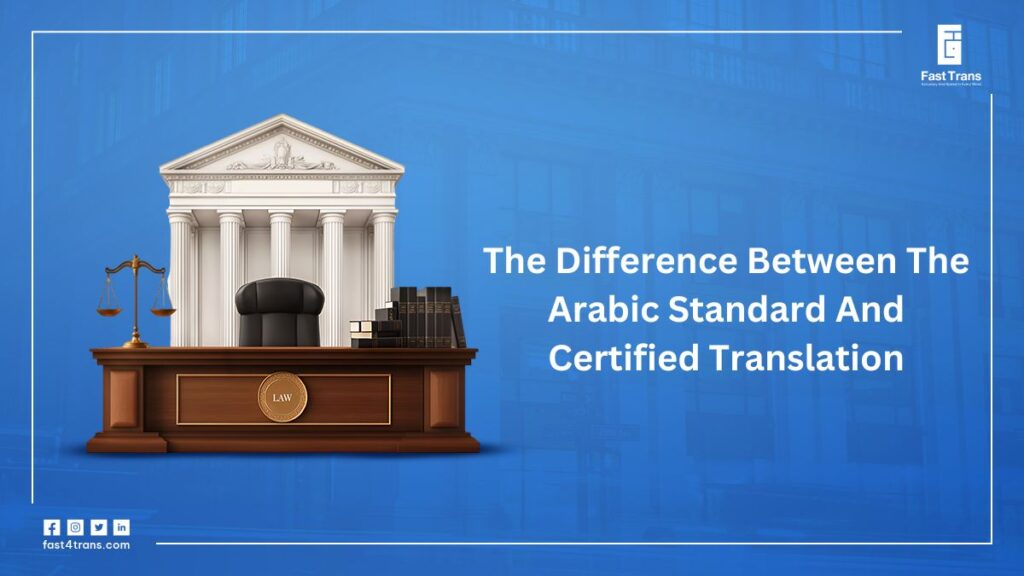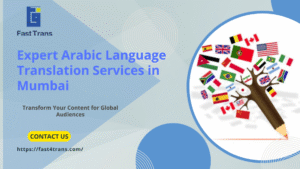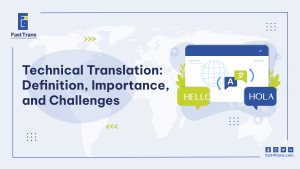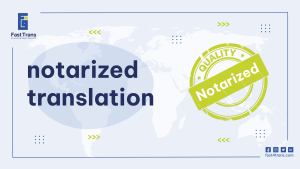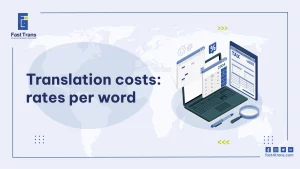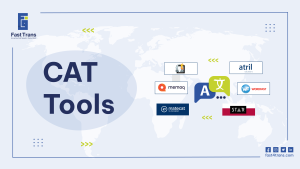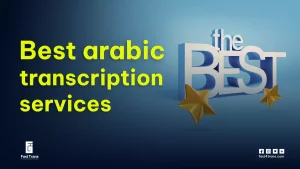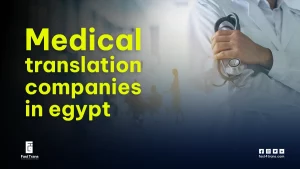Arabic is one of the most widely spoken languages in the world, and the demand for high-quality Arabic translation continues to grow across industries, from business and academia to law and government. However, not all translation services are the same. One of the most common points of confusion for clients is the difference between standard translation and certified translation.
While both aim to convey meaning accurately from one language to another, they serve very different purposes and are accepted in different contexts. Understanding this distinction is essential to avoid costly mistakes, ensure compliance with official requirements, and choose the right service for your specific needs.
What is Standard Arabic Translation?
Standard Arabic translation refers to the process of accurately converting content from one language into Arabic (or vice versa) without the need for official validation or legal certification. Its primary focus is on clarity, accuracy, and cultural relevance, ensuring the message is understood correctly by the target audience.
This type of translation is commonly used for business documents, websites, marketing content, product manuals, books, reports, and general communications. In these cases, what matters most is that the translation is clear, natural, and adapted to the cultural and linguistic context of Arabic speakers, rather than being formally recognized by government or legal authorities.
Because it does not require additional verification, standard translation is typically faster and more cost-effective than certified translation. It is ideal for projects where professional quality and readability are essential, but legal or institutional approval is not required.
What is Certified Arabic Translation?
Certified Arabic translation goes beyond standard translation by including an official statement of accuracy and authenticity from the translator or translation agency. This certificate, often signed and stamped, confirms that the translation is a true and faithful rendering of the original document.
Certified translations are usually required for legal, governmental, and academic purposes where accuracy and legitimacy must be formally recognized. Examples include:
- Birth, marriage, and divorce certificates
- Immigration and visa documents
- Academic diplomas and transcripts
- Legal contracts and court documents
- Medical or financial records for official use
Unlike standard translation, certified translation carries legal weight. It may be accompanied by the translator’s credentials, seal, or notarization, depending on the requirements of the country or institution. Because of this added verification, certified translations often take more time and come at a higher cost than standard translations.
Key Differences Between Standard and Certified Translation
Although both standard and certified Arabic translations ensure accuracy and clarity, they serve very different purposes. The table below highlights the main distinctions:
| Aspect | Standard Translation | Certified Translation |
| Purpose | Everyday use: business, personal, or general communication | Official/legal use: immigration, academic, and governmental documents |
| Validation | No formal validation required | Accompanied by a signed/stamped certificate of accuracy |
| Acceptance | Accepted for personal, corporate, or informal purposes | Accepted by courts, universities, embassies, and government bodies |
| Cost & Turnaround | Faster and more cost-effective | It may take longer and cost more due to certification requirements |
Why Does This Difference Matter?
Understanding the distinction between standard and certified Arabic translation is crucial for avoiding unnecessary complications. Choosing the wrong type of service can lead to delays, added expenses, or even rejection of your documents by official authorities.
By selecting the appropriate translation service from the start, you can:
- Prevent rejection of applications or submissions by government offices, universities, or courts.
- Save time and money by matching your needs with the right level of translation service.
- Ensure credibility in legal, academic, or professional settings where accuracy and authenticity are non-negotiable.
Simply put, knowing when to request a standard translation and when a certified one is required helps you stay compliant, efficient, and confident in the process.
When to Choose Standard vs. Certified Translation
Think of it this way: not every document needs a stamp of approval. Some just need to be clear, accurate, and easy to read—while others must carry official weight.
Go for a Standard Translation when you’re working on:
- A company website or blog that speaks to customers
- Marketing campaigns, brochures, or product manuals
- Day-to-day business emails, reports, or presentations
These don’t need legal validation, just polished, culturally accurate language.
Opt for a Certified Translation when the stakes are higher, such as:
- Submitting documents for immigration or visa applications
- Handling legal papers like contracts, agreements, or court files
- Presenting diplomas, transcripts, or professional qualifications abroad
- Providing birth, marriage, or divorce certificates to official authorities
In short, if the document is going to a government office, court, or university, play it safe with a certified translation. If it’s just for business, marketing, or internal use, standard translation will do the job perfectly.
Challenges in Choosing Between Standard and Certified Translation
While understanding the difference between standard and certified Arabic translation is important, there are also a few challenges clients should keep in mind before making a decision:
1. Cost Implications
Certified translations typically come at a higher price due to the additional verification, stamping, and sometimes notarization involved. This can make them less cost-effective for projects that don’t require certification.
2. Availability of Certified Translators
In certain fields, such as medicine, engineering, or law, it can be difficult to find certified translators with the required subject-matter expertise. This can extend timelines and increase costs.
3. Regional Differences
Certification requirements are not universal. For example, documents accepted in Egypt or Gulf countries may need different validation compared to those submitted in the US, UK, or EU. Understanding these regional variations is essential to avoid rejection or delays.
Professional Standard and Certified Translation Services Providers You Can Trust
At Fast Trans, we understand that every document serves a different purpose, and choosing the right type of translation can make all the difference. Whether you need a standard translation for business, marketing, or internal communication, or a certified translation for legal, academic, or governmental use, our team of professional translators is here to help.
We combine linguistic expertise, cultural sensitivity, and industry knowledge to deliver translations that are not only accurate but also tailored to your needs. For certified translations, we provide the necessary signatures, stamps, and certificates of accuracy required to ensure full acceptance by authorities, embassies, and institutions around the world.
With Fast Trans, you get more than just words translated—you gain a trusted partner dedicated to clarity, compliance, and professionalism.
Explore Fast Trans Specialized Arabic Translation Services
Translation isn’t one-size-fits-all, and at Fast Trans, we tailor our services to match your exact needs. From standard Arabic translations that make your business content engaging and accessible, to certified translations that carry full legal recognition, we cover the full spectrum of professional translation solutions.
Our expertise spans multiple fields, including:
1. Medical & Healthcare Translation Services
Fast Trans provides certified medical translation services for pharmaceutical companies, hospitals, and healthcare organizations. Our medical translators specialize in clinical trials, medical devices, patient records, and regulatory documentation with strict confidentiality and accuracy standards.
2. Legal Translation Services
Fast Trans delivers precise legal translation services for contracts, court documents, patents, and corporate legal materials. Our certified legal translators ensure compliance with local and international legal requirements while maintaining the integrity of legal terminology.
3. Technical & Engineering Translation
Fast Trans handles complex technical documentation translation, including user manuals, engineering specifications, safety protocols, and industrial equipment guides. Our technical translators combine linguistic skills with industry-specific knowledge to deliver accurate technical communication.
4. Financial & Banking Translation
Fast Trans provides secure financial translation services for financial statements, banking documents, investment reports, and insurance policies. Our financial translators understand regulatory compliance and maintain the highest standards of confidentiality and accuracy.
5. Academic & Educational Translation
Fast Trans offers translation services for academic institutions, research papers, educational materials, and student documents. Our academic translators specialize in various fields of study and ensure scholarly accuracy and proper terminology.
6. Website & Software Localization
Fast Trans offers comprehensive software and website localization services that adapt your digital presence for local markets. Our localization experts handle UI/UX adaptation, cultural customization, and technical implementation for seamless user experiences.
Read Also: How Much Do Arabic Translation Services Cost?
Get Your Documents Translated with Fast Trans – Start Today!
At Fast Trans, we make professional Arabic translation simple, fast, and reliable. Whether you need a standard translation for your business materials or a certified translation for legal or official documents, our team is ready to deliver accuracy, cultural precision, and full compliance with international requirements.
Don’t risk delays or rejections, choose a trusted provider who ensures your words carry the right meaning in every context.
Contact us today via our official website
What Our Customers Say
Since the translation project is theirs, we encourage the clients to discuss every stage of the process.
You can check our clients’ comments for yourself at Google Reviews.
Conclusion
The difference between standard Arabic translation and certified Arabic translation is more than just terminology, it determines how and where your documents will be accepted. Standard translation is perfect for business, marketing, and everyday communication, while certified translation ensures legal recognition and official approval for immigration, academic, or governmental purposes.
By understanding these distinctions, you can save time, reduce costs, and avoid unnecessary setbacks. Whether your goal is to expand into new markets, submit documents for official use, or communicate clearly with your audience, choosing the right service is the key to success.
At Fast Trans, we provide both standard and certified Arabic translation services backed by expertise, precision, and trust. No matter the type of document, we make sure your message is delivered accurately, professionally, and with the recognition it deserves.

